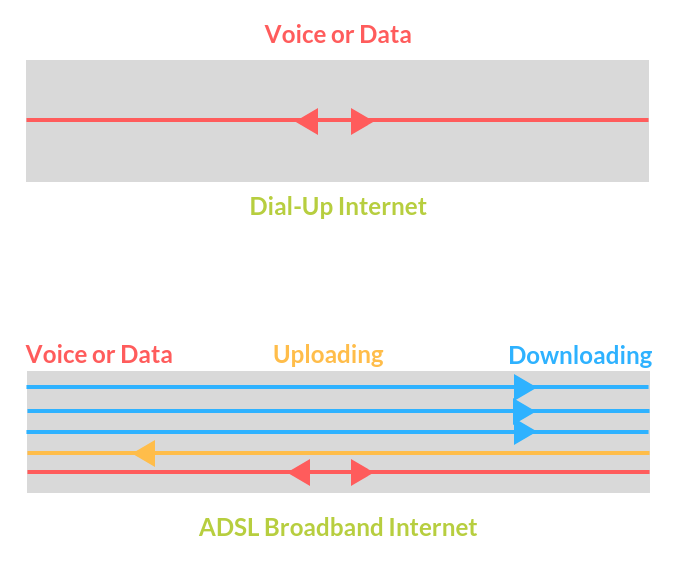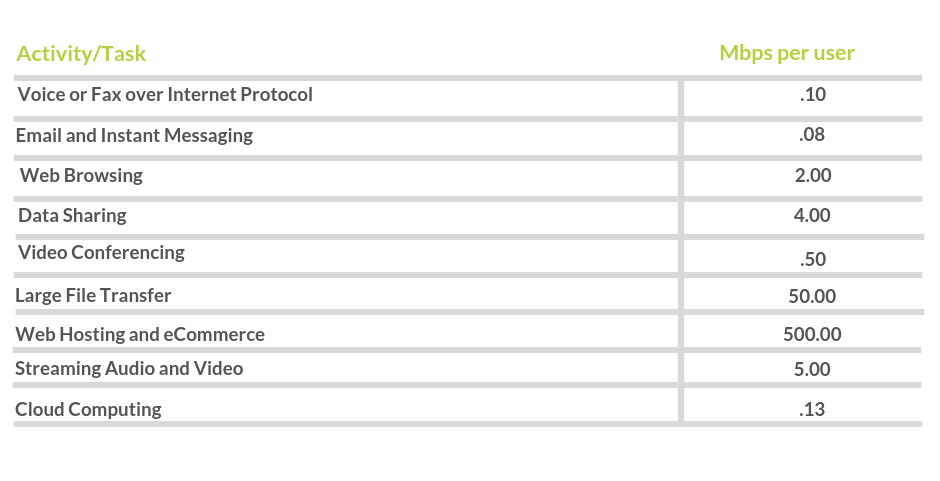Navigating Travel Industry Risks with Intelligent Communications
We’re going to explore some real-life unforeseen circumstances that the travel industry has had to navigate and how intelligent communications solut...
Those of us old enough to remember the days of dial-up up will know only too well the pains of a slow internet connection. Today, 53 percent of internet users abandon a website that takes three seconds or more to load. In the dial-up days, you’d be lucky to load 1000 pixels in that amount of time – not to mention your landline would be out of action until you came offline.
There’s no doubt about it, broadband connectivity helps businesses operate faster and more efficiently. In this article we’re going to show you how to calculate your business’s connectivity needs. But first, what is broadband? How does it work?
“Broadband” was originally a term used in radio. A broadband connection is just a signalling method that handles a wide (or “broad”) band of frequencies. When people talk about “broadband” in relation to internet connectivity, what they really mean is a fast internet connection.
Getting slightly more technical, what people refer to as broadband is usually an Asymmetric Digital Subscriber Line (ADSL) connection. Even though today you can access the internet and use your landline at the same time, ADSL still works via your phone line – that’s the reason internet service providers require you have a landline connection if you want to use broadband.
There are other Digital Subscriber Line (DSL) services available – such as Symmetric Digital Subscriber Line (SDSL). However, since most people use “broadband” to refer to ADSL, we’re going to focus on that in this article.
A good internet connection allows you stream television and songs, download images and music, play online games and even order food. So how on earth does all that information get transported down your phone line?
It’s all about frequencies. To begin, think about using your landline. You speak into a piece of plastic and somehow the person miles away on the other side hears your voice loud and clear through their own piece of plastic. That’s incredible! But how does a cable “carry” your voice in this way?
Well, inside your piece of plastic is a metal disc called a diaphragm. The sound waves made by your voice are converted into electrical energy by this diaphragm. This electrical energy is sent over the wire and is converted back into sound waves on the other side. Simple.
Fine. But how does this relate to broadband?
When you use your telephone, the signals you send are analogues of sound waves. In terms of frequency, this means that phone calls are made by sending very low frequencies. But the cables that carry these signals can handle much higher frequencies than those used in traditional voice calls. They are also capable of sending digital binary code as well as analogue electrical signals.
As such, your phone line has a lot of unused “space”. ADSL broadband uses this space to send its digital binary signals. Whereas dial-up internet uses the same “space” (which is why you couldn’t take calls when you were using it).

Like separating a motorway into distinct lanes, ADSL allows information to travel in parallel streams. By dividing your phone line into many different channels in this way, ADSL is far more efficient than dial-up internet.
Because most people have a greater need to download information rather than upload it, more space is given to download channels. This is why upload speeds are usually slower than download speeds.
While a typical ADSL connection is enough for most personal users, businesses often have requirements that exceed a standard connection. The average personal broadband speed in the UK is 46.2Mbps. This is more than enough for most people’s personal needs.
However, businesses – with all their file-sharing, internet calls, video conferences and cloud computing – often require much faster speeds than this. In fact, because so much work takes place online, a slow internet speed can have a very real negative impact on a business.
It’s not difficult to calculate what speed your business internet connection needs to be to serve you properly. Use the table below to work out how much speed you need.

Depending on how big your business is, you may get along just fine with a business broadband connection. FTTC, which uses both fibre and copper, can give businesses with slightly higher requirements the bandwidth and reliability they need.
Organisations with very high connectivity requirements will benefit from a private circuit such as MPLS – which offers incredibly fast internet speeds and complete privacy since it doesn’t use the public internet.
Elite Group provides a range of business broadband and connectivity solutions. We are able to meet the connectivity requirements of small businesses and SMEs through to multinational corporations. If you’d like to find out more about which type of connectivity solution will best serve your business, get in touch with one of our agents today.